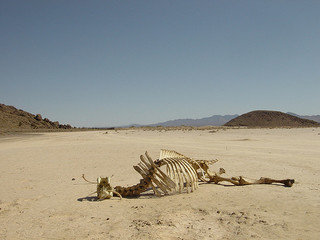A Question of Scarcity
by Andrew Fanning
 ‘Tis the season for untold numbers of undergraduate students around the world to receive their first exposure to “Principles of Economics.” During the first couple of lectures, economic terms and concepts are thrown at impressionable young minds at a dizzying pace: opportunity costs, rational choice, marginal change, market economies, and the mother of them all, scarcity.
‘Tis the season for untold numbers of undergraduate students around the world to receive their first exposure to “Principles of Economics.” During the first couple of lectures, economic terms and concepts are thrown at impressionable young minds at a dizzying pace: opportunity costs, rational choice, marginal change, market economies, and the mother of them all, scarcity.
The conventional economic meaning of “scarcity” appears on the first page of virtually every first-year economics textbook. Here’s the version from the textbook I use: “Although we have boundless wants, our resources are limited.” The perceived battle between unlimited wants and limited means forces us to make tough choices about how to manage scarce resources. Conventional economists assure us that their “science” provides the proper instructions for making these tough choices. Thus, the “scarcity principle,” besides having intuitive appeal, provides the justification for the very existence of neoclassical economics.
The scarcity principle, however, is just an assumption, and it appears to be a dangerous one. Maybe in the empty world of the 18th century classical economists, it was mostly harmless to assume that people have unlimited wants because the vast majority of people had so little. But now that we live in a full world where the global economy is bumping against ecosystem limits, it’s time for economists to stop assuming that everyone always wants more and start accepting that it’s possible to have too much.
Still, questioning the relevance of scarcity in driving human behavior is a no-no in a conventional economics class. The student doing the questioning is likely to be shut down by the accursed phrase, “That’s not economics.”
The first reason why it’s tough to argue the point with conventional economists is that they only concern themselves with the scarcity of resources relative to other resources in a market, neglecting the reality of absolute scarcity. Philip Lawn shows the difference between relative and absolute scarcity clearly by asking, on the one hand, what happens to the price of a non-renewable resource like oil as the stock is depleted? Most people see that stock depletion leads to an increase in absolute scarcity and predict that the price would increase. On the other hand, he asks, what will happen to oil prices if OPEC significantly increases extraction rates and floods the market? Here, most people would predict that the price of oil would decrease as the increased flow of oil makes it less scarce relative to substitutes like coal. Of course, these scenarios are two sides of the same coin. In an empty world, the flow effects of relative scarcity on prices have dominated the stock effects of absolute scarcity, but this cannot continue indefinitely on a finite planet. In his book, Steady-State Economics, Herman Daly writes:
Absolute scarcity increases as growth in population and per capita consumption push us ever closer to the carrying capacity of the biosphere. The concept presupposes that all economical substitutions will be made. While such substitutions will certainly mitigate the burden of absolute scarcity, they will not eliminate it nor prevent its eventual increase.
If there is no choice to substitute one scarce resource for another, then there is no relative scarcity, and conventional economists will often concede the point, holding that such a situation lies outside the domain of economic analysis. Without choices it’s easy, they say — you just do what you gotta do. It’s not big-E economics. Case closed.

Neoclassical notions of scarcity differ from the absolute scarcity seen in a full world (credit Kiel Bryant).
A second reason it’s hard to argue with conventional economists about scarcity is because they disregard two features of human behavior. The first feature is that people prioritize some wants above others. Economists often ignore the fact that some goods and services are fundamentally more important and sought earlier than others. No, they cry, this would introduce unacceptable value judgements to our “positive” theory! As John K. Galbraith wryly noted, “Nothing in economics so quickly marks an individual as incompetently trained as a disposition to remark on the legitimacy of the desire for more food and the frivolity of the desire for a more expensive automobile.” The second behavioral feature is susceptibility to advertising and other marketing techniques. Despite the omnipresent sheen of the $500 billion global advertising industry sparkling on modern society, mainstream economists maintain that consumers know exactly what they want because, well, they just do. It’s not big-E economics if people don’t know what they want. Case closed. Again.
Economists often make strange assumptions about the scarcity of resources, but maybe their assumption about wants is stranger. Do people actually have unlimited wants, and has anyone bothered to test this hypothesis? Toward an answer, I recently came across a couple of studies that provide compelling evidence demonstrating people don’t have unlimited wants ingrained in their DNA.
The first is a fascinating book edited by John Gowdy titled Limited Wants, Unlimited Means about the economics of nomadic hunter-gatherer societies. As the title makes abundantly clear, the authors argue that our society of mass consumption has much to learn from members of these highly mobile societies who do not want to carry material possessions beyond those which they can make and replace from resources readily available.
The second study is an experiment whereby researchers team up with a Chinese fast-food restaurant in the United States to test a number of strategies for reducing calorie consumption among unsuspecting customers. They find that a much better strategy than calorie labeling is to simply ask people if they would like to “down-size” their meals during the ordering process. In particular, the researchers found that more than 30% of customers accepted the opportunity to receive less food, regardless of whether or not they received a discount! Although this result does not reject the unlimited wants hypothesis outright, the question of why calorie labelling is less effective than a verbal offer cannot be explained under neoclassical assumptions.
An alternative explanation is that people have difficulties controlling themselves. The best part of the fast-food study is that a substantial portion of customers readily recognized that they wouldn’t be able to stop consuming food once it had been placed on their plates, so they opted for less when given a nudge at a strategic point in their consumption decision. Clearly, finding these strategic points to encourage “right-sized” consumption is an urgent challenge on a full planet. Hopefully researchers can help us find more of them.
—
Andrew Fanning grew up on the blustery east coast of Canada where he eventually earned a master’s degree in economics. His interests include lots of things, especially the capacity of the planet to support life.





Very well articulated and timely article Andrew! I am very interested to read the John Gowdy book that you mentioned.
I do wonder about your point on the assumption of unlimited wants though. Those studies that you mentioned are interesting, but surely they are dwarfed by the amount of studies and findings arguing the opposite point; that people do in fact have unlimited wants. How else do you explain the fact that the vast majority of North Americans spend more money than they earn in a year?
Are “neoclassical assumptions” just the scapegoat for greedy humans?
Your point about the potential to influence people at strategic points in their consumption decisions is very interesting. And I think provides a potential pathway forward. Then again, how likely is McDonald’s to adopt such a strategy? And what percentage of fast food customers agree to “up-size” their meals during the ordering process?
All in all, I think you have sparked a very worthwhile discussion and I for one am in favor of anything that reduces humanity’s currently unsustainable impact on this planet.
Well Said Andrew! There are far too many concepts in economics accepted as fact when they should be open to discussion and fully appreciate your thoughts on scarcity.
After reading your article, I asked myself, do I have unlimited wants? Well, yeah, I probably do, but I don’t think you are necessarily suggesting that people are not inherently un-satiable. Rather, sounds like you might be suggesting that there could be room in economic theory to incorporate aspects from modern human behavior, in hopes of forming more sustainable policies.
I personally won’t be holding my breath for McDonald’s to start promoting down sizing any time soon, but do believe that the experiment you point to reveals an interesting observation that perhaps people can in fact challenge their wants, if given the right motivation or understanding.
Great article, look forward to reading more from you, and also you’re the man!
Every living being operates with the desire for things it is stimulated by. The difference between humans and the natural world is that the rest of the world’s animals and plants have OTHER animals and plants to moderate them (predator-prey relationship). The modus operandi of capitalized civilization is to first create a walled city of civilization which isolates humans in many ways from the moderations of nature, and then to exploit the human brain’s ability to live in a fantasy model of the universe. 7 billion universes can absorb a lot of resources and stimuli.
The key to the scarcity/demand ratio lies in the feedback mechanisms. Every single thing we do or implement as civilized people needs to have a moderating feedback. Every thing in free market capitalism tries to eliminate negative feedbacks in order to make higher profits and increase volume of cashflows. Yes, there it is: “cashflow”.
The only thing that moderates cashflow is the price level. People buy stuff because it is perceived to be inexpensive, regardless of whether they have to go in debt or not (in some cases, BECAUSE they go into debt: such as buying a house to get a tax write-off).
The population doesn’t perceive the cost of wars for oil or boobaroo because those costs are hidden with income taxes, corporate taxes, tariffs, and debts (future taxes). If you want to have an open market capitalism that is honest, it must have a consumption tax instead of any other taxes (except maybe the need for tariffs to protect regional interests and to equalize trade exchanges over disparate economic advantages). The consumption tax needs to put the ACTUAL cost of products at the point of decision: the cash register/checkout line, which is where all voting takes place.
The rich get richer and the poor get poorer and the planet gets raped because people spend money to accumulate resources that are extracted from the lands they should be husbanding, not exploiting. The opposite of consumption is not frugality, it is generosity. Humans should be a useful resource to the land, not the other way around.
It’s a pity you don’t have a donate button! I’d most certainly donate
to this excellent blog! I guess for now i’ll settle for
bookmarking and adding your RSS feed to my Google
account. I look forward to new updates and will share this site with my Facebook group.
Chat soon!